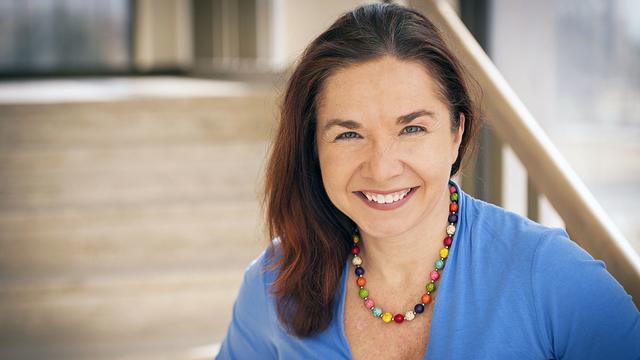The Humphrey School of Public Affairs is proud to welcome renowned climate scientist and communicator Katharine Hayhoe as the next speaker in its Swain Climate Policy Series.
Hayoe will speak at a virtual event April 12 at 4 p.m. CDT; it is co-sponsored by the Big Ten Conference's collaboration, Democracy in the 21st Century, and students from all 14 schools in the conference are invited to participate.
Hayhoe is chief scientist for The Nature Conservancy, a scholar at Texas Tech University, and author of a new book, Saving Us: A Climate Scientist’s Case for Hope and Healing in a Divided World.
The evidence is clear that our climate is changing—across the United States and the planet as a whole. Temperatures are increasing, rainfall patterns are shifting, and extreme precipitation and heat wave events are becoming more frequent.
The choices we make today will have profound impacts on our future: the faster we cut our carbon emissions, the less we’ll need to adapt and the more suffering we can avert. In such a politically charged environment, are we still able to act on climate? Or is it too late?
Hayhoe will address those questions as she untangles the complex science connecting our choices to future impacts, and highlights the actions that are being taken to address this critical issue today.
The event on Tuesday, April 12, at 4 p.m. CDT, is free and open to the public, but registration is required.
The Swain Climate Policy Series is geared to mobilize civic engagement on an ongoing basis, year round. Hayhoe is the second speaker in the series; former vice president and longtime climate activist Al Gore was the first, appearing in October 2021.
The Swain Climate Policy book club chose Hayhoe's book, Saving Us: A Climate Scientist’s Case for Hope and Healing in a Divided World, as its first selection. It's based on her popular TED Talk, in which she argues that the most important thing that individuals can do to address climate change is to talk about it with others by connecting over shared values such as family, community, and religion.
About Katharine Hayhoe
Katharine Hayhoe, PhD, is an atmospheric scientist whose research focuses on understanding what climate change means for people and the places they live. She is the chief scientist for The Nature Conservancy, where she oversees the organization's global climate advocacy and adaptation work. She is a Horn Distinguished Professor and Endowed Professor of Public Policy and Public Law in the political science department at Texas Tech University.
Hayhoe has been named one of TIME's 100 Most Influential People, the United Nations Champion of the Environment, and the World Evangelical Alliance’s Climate Ambassador. She is a well-known public speaker addressing climate science, impacts, communication, and faith. She hosts the PBS digital series Global Weirding, currently in its fifth season.
About the Swain Climate Policy Series
In honor of his 100th birthday in 2021, retired government, business, community, and University of Minnesota leader Thomas H. Swain announced the establishment of Advancing Climate Solutions. Now. The Swain Climate Policy Series to engage and energize students throughout the University of Minnesota, as well as residents across the state, to become part of the solution to climate change through policy and advocacy.
The Humphrey School, in partnership with the University of Minnesota’s Institute on the Environment, developed the series and the Swain Climate Policy Fund to bring public lectures featuring world-renowned climate experts and champions, policy-focused student internships and research initiatives, and opportunities for participants to learn how to be more effective climate stewards through both individual and collective action.


